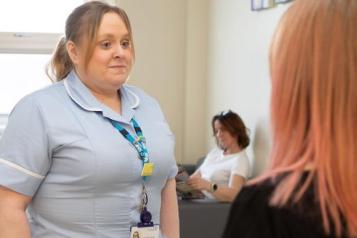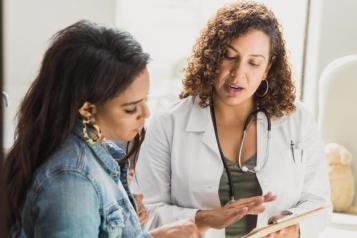Only 7% of people had a good understanding of gynaecological symptoms before experiencing them
• Only 5% said they had a good understanding of gynaecological cancers
• Only 7% said they had a good understanding of gynaecological symptoms
• 5% said they had a good understanding of HPV (human papilloma virus)
• 15% said they had a good understanding of cervical screening
The UK’s leading gynaecological cancer charity, The Eve Appeal, has published new survey findings to launch its annual fundraising and awareness-raising campaign Get Lippy, which runs throughout May.
The survey (Yougov) found a worrying lack of timely knowledge about gynaecological cancers, conditions and symptoms, with only 7% of people having knowledge of gynaecological symptoms before they personally experienced them or they affected a loved one, and 5% of people believing they had knowledge of the gynaecological cancers (womb, ovarian, cervical, vulval and vaginal).
Nearly 4 in 10 (38%) surveyed said they wished they had been taught more about the gynaecological symptoms to look out for, either at home or at school, and over a third of them (35%) wished they had been taught more about gynaecological health conditions.
Also significant was the lack of knowledge about Human Papilloma Virus (HPV) and cervical screening, the test which looks for the virus and helps prevent cervical cancer from developing. HPV is responsible for 99.8% of cases of cervical cancer, nearly 70% of cases of vulval cancer and over half of vaginal cancers. Less than a quarter of women surveyed felt they had a good understanding of cervical screening before it happened to them or a friend or family member (23%), and only 5% of women had a good understanding of HPV.
HPV is an extremely common virus which can be contracted by any skin-to-skin sexual contact. Usually, people’s immune systems can clear the virus on their own however high-risk HPV infections which don’t clear can lead cells to turn cancerous. There is a national HPV vaccination programme which targets certain strains of HPV to reduce the risk of related cancers developing.
The HPV vaccination is offered to all children aged 12 and 13 at school in Year 8, and for people aged up to 25 through GP practices, and up to 45 for men who have sex with men through sexual health clinics. It doesn’t protect against all strains of HPV so attending cervical screening appointments when invited, as well as getting any worrying symptoms checked by a doctor, is still vital.
Athena Lamnisos, The Eve Appeal CEO, says: “These results highlight a worrying gap in both knowledge and awareness. When it comes to health issues, we know that fear, stigma and embarrassment are reduced when a subject is normalised and understood – that basic health education needs to start at an early age. That’s why Get Lippy is such an important campaign – we need to help everyone have normal conversations about gynaecological issues. Knowing basic information about signs, symptoms and cancer risk factors such as the HPV virus, is vital to supporting people to keep themselves well.”
Dr Naomi Sutton, Sexual Health Consultant, says: "Embedding fundamental knowledge about our bodies, including our genitals, is crucial to prevent fear and stigma and to empower people to present to a health care professional in a timely manner should they notice changes.There are so many myths and misunderstandings, especially when it comes to sex and our genitals, that education needs to be started when children are young, in an age-appropriate way, so they can build a healthy understanding of their own normal. It is only education and knowledge which will help to combat the fear and shame someone might feel when diagnosed with HPV, or any other Gynaecological problem."
Karen Hobbs, Get Lippy ambassador and cervical cancer advocate says: "I didn't know anything about HPV until the moment my doctor told me that I had cervical cancer, caused by a high-risk strand of HPV, HPV18. I was 24, and had been given very little sex education at school, let alone any gynae health information as a young adult. I was too old for the HPV vaccine and too young for a cervical screening test, so very much caught in the middle. I feel sad and frustrated that I only learned about gynae cancers when being diagnosed with one, and I know I'm not alone in that. I remember telling someone that I had cervical cancer, they asked 'how do you get that?' - a little phrase I say when telling this story is, 'would they have asked the same, if I said breast, bowel or brain?' - there is an immediate curiosity and secrecy attached to having a gynaecological cancer, and when I explained that it was caused by HPV, they said 'but I thought you had a boyfriend?'. Coping with a cancer diagnosis at 24 was hard enough, but having to explain and almost defend myself because of the type of cancer I had, is something that nobody should have to go through. We need to educate everyone on HPV and the related cancers, to reduce the misinformation and stigma surrounding these subjects."
Dr Anita Mitra, Obstetrician and Gynaecologist and Author of the ‘Gynae Geek: your no-nonsense guide to down there healthcare’, says:
"Unfortunately the statistics don't shock me, because they represent what I see in my day-to-day practice. Receiving a diagnosis of a gynae cancer is devastating, but hearing about these conditions for the first time must make it even more scary. The Eve Appeal provides invaluable support to people in this situation, and I don't ever hesitate to send my patients in their direction because I'm confident they'll always receive the support and reliable, evidence-based information that they deserve for themselves and their loved ones."
Dr Aziza Sesay, GP and women’s health specialist, says: "There is a lot of shame and stigma associated with gynaecological health and sadly this is perpetuated by the constant censorship surrounding the topic as a whole and even when using simple anatomical words. So, it is no surprise that awareness is lacking and the stats outlined are so low. Gynaecological anatomy, symptoms and conditions are not embarrassing – more than half the population experience them. The reality is that these same conversations, which are not spoken about enough because of shame and discomfort, are crucially lifesaving. Many gynaecological cancers are preventable and treatment is more likely to be successful if caught early. Let’s keep smashing the taboo. Let’s all Get lippy!"
The results of this survey have been published to launch The Eve Appeal’s Get Lippy campaign. Every May the charity joins forces with some of the UK’s leading health and beauty brands to Get Lippy about gynaecological cancer. It raises awareness of the key symptoms, breaks down the taboos that stop people accessing medical help, and raises money to fund research into the prevention and earlier diagnosis of all five gynae cancers.
This year Get Lippy will be asking supporters, celebrities, politicians, healthcare professionals, beauty bloggers and members of the public to share their ‘Younger Selfie’ and what they wish they’d known about gynae health when they were younger.


